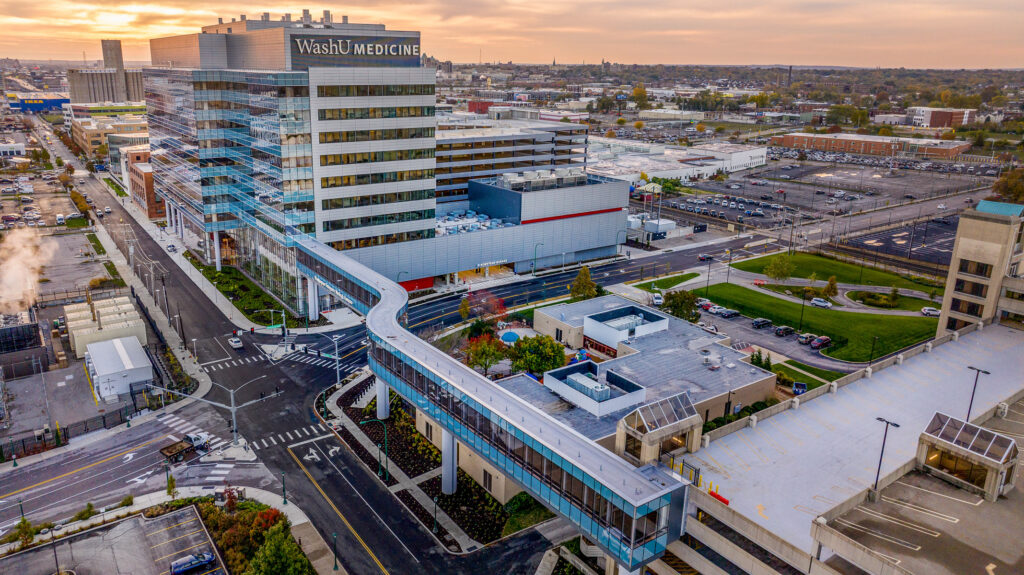AGCMO Keystone Awards 2024 include “S”-curve skywalk bridge linking new WashU research building to parking garage

Nov. 8, 2024 — An “S”-curved pedestrian skywalk bridge built over an existing daycare facility and facing other construction challenges is an outstanding example of how a project can overcome challenges and meet high standards in safety while sticking to a budget and a schedule. The project garnered design and build firm KAI a 2024 Associated General Contractors of Missouri (AGCMO) Keystone Award for its work on the Jeffrey T. Fort Neuroscience Research Building Link Bridge at Washington University’s School of Medicine.

The Keystone Awards (PDF) are presented yearly to contractors who overcome significant challenges to achieve problem-solving solutions over the course of a project. Projects are assessed based on how contractors overcome challenges and meet high standards in safety, budget management and schedule adherence rather than focusing solely on aesthetics or scale. A panel of judges, including experts from architecture and engineering firms as well as academic institutions, evaluated the nominees.
Other notable winners include Ben Hur Construction for its work on Procter & Gamble’s manufacturing facility; PARIC Corporation for the Kings Hill Redevelopment; Millstone Weber for the I-270 North Design-Build project; and Russell for the 21c Museum Hotel St. Louis renovation.
Jeffrey T. Fort Neuroscience Research Building Link Bridge
For the pedestrian skywalk bridge project, KAI served as the general contractor, subcontracting under McCarthy Building Companies, to build the 360-foot-long bridge connecting St. Louis Children’s Hospital to Washington University’s new, $600 million Jeffery T. Fort Neuroscience Research building, a state-of-the-art, 609,000-square-foot facility that represents a new center of gravity for the campus.
Designed by CannonDesign, the unique bridge features five, 6-foot-diameter structural concrete columns and prefabricated structural steel wrapped in curtainwall glazing. It is 360 feet long and 55 feet tall, with its longest span of 120 feet over a city street and an “S” curve to match up the 11-story Neuroscience Research building to an existing parking garage.

Led by Project Manager Cameron Welch, KAI overcame several obstacles on the project, which included working above an active daycare, to deliver the project on budget in March 2023.
Piers were drilled within inches of existing utilities. Dense rebar installations required custom concrete mixes to flow through small voids between the steel rebar and we had to hoist massive 100,000-pound steel sections into place. All of our work had to be performed at night starting at 7 p.m. to work around an existing daycare located underneath the bridge.
Project Manager Cameron Welch
KAI also built a passageway connecting the new Neuroscience Research building to a 1,200-foot-long elevated pedestrian skywalk built by KAI in 2017 that connects a pair of parking garages with the main hospital on the BJC HealthCare/Washington University Medical Center campus.
In addition to the work of KAI Build on the pedestrian bridge, KAI Design was also tasked with designing an adjacent 1,846-space parking garage to support the new research building and surrounding facilities. The KAI Design team responded with a 593,000-square-foot garage utilizing two-way drive aisles to allow for easier circulation. In addition to first level access between the garage and the research building, a link connects the fourth level of the garage and the third level of the research building.
KAI designed the garage with durable post-tensioned concrete which allowed it to be constructed in close proximity to the research building, and its exterior features precast concrete panels and an elevator tower wrapped in a metal panel system to match the research building’s facade.
Because the construction site was very tight, with the garage to be constructed less than a foot from the property line on one edge and just feet from the new research building, KAI’s team also provided BIM modeling, schematic design, construction administration and design-build services to aid the project’s general contractor, Tarlton Corporation.
The Neuroscience Research Building is one of the world’s largest and enables the strategic alignment and co-location of Washington University School of Medicine’s nationally recognized program’s strengths in neuroscience, neurology and psychiatry through research and its applications to education and clinical practice. KAI said it is grateful to have been part of the team to bring this impactful project to fruition.
KAI Enterprises is a national design and build firm providing delivery-oriented building solutions with a diverse portfolio of experience, in-house multi-discipline professionals, and expertise in both design and construction delivery. Founded in 1980, KAI has been instrumental in transforming communities through its expertise in residential, commercial, K-12, higher education, healthcare, science and technology, aviation, mobility, sports and entertainment, government, water and community-focused projects. KAI Enterprises is comprised of four distinct business units: KAI Design, KAI Engineering, KAI Build and KAI 360 Construction Services.
Find the complete list of the 2024 Keystone Awards (PDF) here.
